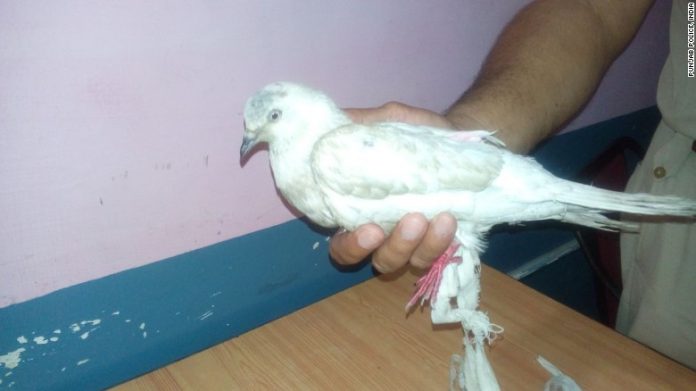
ISLAMABAD, Pakistan – If any further proof were needed that geopolitical intrigue can stalk the humblest of Pakistan’s inhabitants, consider the recent cases of two Pakistani birds.
The first is a pigeon, a species that people all over the country raise on their rooftops as a simple, inexpensive pleasure and a brief escape from their daily struggles with poverty, corruption and clogged streets below.
Some weeks ago, tensions were running especially high between Pakistan and its perennial next-door rival India. The source was Kashmir, the disputed border region where Muslim protesters had been blinded with pellet guns and Indian soldiers had been burned to death in a late-night attack by insurgents.
Into the fog of belligerent rhetoric between the two nuclear powers wandered a white pigeon, which was caught and caged by Indian security forces in a border district adjoining Kashmir.
According to Indian news agencies, the bird was suspected of having “Pakistani links” and was carrying a warning message for Indian Prime Minister Narendra Modi. The arresting officer posed with his feathered prisoner, and the image soon circulated on social media.
Around the same time, Indian authorities in Kashmir said that they had also discovered 150 dehydrated pigeons stuffed into a car and that they suspected the birds had been smuggled for purposes of espionage. An official was quoted as saying that the pigeons had suspicious multicolored rings attached to their feet. All were turned over to an animal welfare agency while police investigated the case.
Irfan Husain, a columnist for Pakistan’s Dawn newspaper, suggested that the avian seizures were a sign that India remains “a deeply insecure country” despite its large size, rapidly growing economy and military might. “I realize I am sticking my neck out,” he wrote, “but would the Indian authorities please set the poor captive pigeon free?”
No such outcry has yet been raised about the potential plight of another Pakistani bird, the houbara bustard (chlamydotis undulata), a gray-speckled, pheasantlike creature mostly found in North Africa. In Pakistan, this rare variety of bustard is considered an endangered species, and hunting it is banned in some regions.
This past week, the bustard too ran afoul of international politics, this time at the hands of Pakistan’s friends. Parties of Middle Eastern royals often bring trained falcons to hunt smaller birds in Pakistan’s northern mountains and southern deserts. For years, among their favorite targets have been bustards.
Last year, wildlife groups petitioned Pakistani courts to ban bustard-hunting, and the Supreme Court granted their request. But the government of Prime Minister Nawaz Sharif appealed, arguing it had “adversely affected the country’s diplomatic ties with the Middle Eastern countries” and noting that hunts by “foreign dignitaries also bring in considerable funds.”
One of the Sharif government’s closest allies is Qatar, and last month, a Qatari prince came to the prime minister’s rescue in a corruption case before the Supreme Court, where political opponents have accused him of hiding assets abroad, including a group of luxury apartments in London.
Sharif, who has vowed to resign if found guilty, said he had broken no laws but was struggling to explain how his family had acquired the apartments without a money trail or tax bill. Suddenly, the Qatari prince provided a letter stating that his family had given them to the Sharifs as part of an old business settlement.
This week, a Qatari prince from the same family was issued a special permit to hunt 100 bustards in northwestern Khyber-Paktunkhwa province. According to Dawn, the province’s wildlife conservator objected, saying it was a protected species. The matter has not been resolved, but the paper reported that another Qatari royal had recently “faced some resistance” while attempting to hunt bustards in Balochistan province.
“He immediately called the prime minister on the phone,” Dawn reported Sunday, “and things were sorted out.”
(c) 2016, The Washington Post · Pamela Constable

